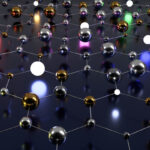
Dr. Christian Beste has made significant contributions to clinical science by advancing neurophysiology in connection to cognitive science for the betterment of patient care.
Dr. Christian Beste’s research facilitates the integration of neurophysiology with clinical care. Advances in cognitive neurophysiology research have led to improved treatments and patient outcomes. Strong collaboration between empirical studies and clinical work characterises his approach to neuroscience.
Dr. Christian Beste’s influence in clinical science and neurophysiology illuminates the pivotal role of cognitive neuroscience in enhancing patient care. His research career has been marked by significant contributions that bridge the gap between basic science investigations and clinical applications. Notably, he has focused on uncovering the neurobiological foundations of cognitive processes, which has direct implications for addressing various neurological and psychiatric disorders. This has included groundbreaking work in identifying the neuronal mechanisms that underpin cognitive control and action, significantly improving our understanding and treatment approaches in these areas.
Through integrative research that combines clinical observations with empirical data, Dr. Christian Beste has advanced the field of neurophysiology, delivering insights that transcend basic science. His professorship for Cognitive Neurophysiology at TU Dresden underscores his expertise and commitment to investigating complex brain functions. Dr. Beste’s work has enriched neuroscience literature and propelled innovations in cognitive neurophysiology research, directly impacting clinical practices and patient experiences worldwide.
Neurophysiological Advancements for Patient Care
Understanding the brain’s intricate processes is pivotal for advancing patient care, especially in disorders like Tourette Syndrome and ADHD. Dr. Christian Beste’s research utilises a blend of neurophysiological tools and cognitive science concepts to pioneer significant improvements in the clinical science of neurology and psychiatry.
Electroencephalography (EEG) and Brain Stimulation Techniques
EEG has been a cornerstone for discerning the electrical activity in the human brain. Dr. Christian Beste’s studies have often employed EEG to unravel the complex neurophysiological underpinnings of conditions such as ADHD, Tourette Syndrome and other neuropsychiatric disorders. Through EEG, researchers can observe the dysfunctions in cognitive control that challenge these patients. Brain stimulation techniques, like transcranial magnetic stimulation (TMS), have complemented EEG by offering insights into brain plasticity and networks, showcasing the therapeutic prowess of brain stimulation for movement disorders and its diagnostic potential.
Innovative methods like transcutaneous vagus nerve stimulation (tVNS) have opened new avenues, emphasis the role of tVNS in modulating brain activity, indicating its relevance in clinical treatments.
Implications for Tourette Syndrome and ADHD Treatment
Clinical science has made leaps in understanding and treating conditions like Tourette Syndrome and ADHD. Dr. Christian Beste, alongside colleagues such as Veit Roessner and Paul Wendiggensen, highlight the applicability of EEG and brain stimulation in improving the quality of patient care. Specifically, these methods have been instrumental in enhancing the precision of treatments offered to patients suffering from these neurodevelopmental disorders.
For Tourette Syndrome, novel therapeutic approaches informed by neurophysiological assessments have led to personalised treatment plans. The utilisation of neuroimaging and EEG by researchers, supports more accurate diagnoses and the analysis of treatment efficacy.
In the context of ADHD, interventions supported by neurofeedback, a technique linked to EEG, have been crucial for addressing the cognitive control deficits. This aligns with Beste’s research into the neurophysiological processes in action control, which has been foundational in refining treatment methodologies.
Innovations in Cognitive Neurophysiology Research
Dr. Christian Beste’s contributions to the field of cognitive neurophysiology have provided critical insights into the complex interplay between cognitive control systems and working memory within the human cortex.
Advances in Cognitive Control and Working Memory
Dr. Christian Beste’s research has led to significant discoveries regarding cognitive control and its relation to human action. Investigations into the frontal cortex have illuminated how this region modulates attention and working memory processes. For instance, Dr. Beste’s scrutiny of theta and alpha band activity in EEG studies has provided evidence of the frontal cortex’s role in coordinating cognitive tasks that require a high degree of control.
Through meticulous analysis, it’s understood that cognitive flexibility—a person’s capability to adapt their cognitive processing strategies to face new and unexpected conditions in the environment—is closely tied to these factors. Dr. Beste’s work suggests that cognitive flexibility isn’t merely a static trait, but rather a dynamic process involving a complex network within the cortex, particularly the frontal regions.
Inhibitory Mechanisms and Perception-Action Integration
Another striking aspect of Dr. Beste’s work is the exploration of inhibitory mechanisms crucial for perception-action integration. Response inhibition, the ability to suppress inappropriate or unwanted actions, is fundamental to adaptive behaviour. His studies highlight how disruptions in cognitive control and response inhibition can lead to difficulties in behaviour that consists of multiple components, which demand integrated processing.
By focusing on the intricate nature of behavioural control, Dr. Christian Beste has brought to light how even when multiple stimuli are present, the brain selectively processes information and inhibits irrelevant responses. Through his rigorous experimental paradigms, he has contributed to an advanced understanding of the neurobiological underpinnings that support such inhibitory control and the complexities of interacting cognitive subprocesses within the human brain.

Dr. Christian Beste’s Contributions to Neuroscience Literature
Dr. Christian Beste’s work has significantly expanded the understanding of cognitive neurophysiology in relation to clinical applications. His research has been pivotal in connecting neuroscientific findings to the improvement of patient care.
Collaborative Research and Notable Publications
Dr. Beste has been involved in extensive collaborative research to push the boundaries of neuroscience. He has made significant contributions to esteemed journals, including but not limited to:
- Biological Psychiatry;
- Brain;
- Cerebral Cortex;
- Communications Biology
- Current Biology;
- Elife;
- Human Brain Mapping;
- iScience
- Journal of Experimental Psychology: General;
- Lancet Neurology;
- NeuroImage;
- Nature Communications;
- Science Advances;
- Trends in Cognitive Science
Through collaborations and his relentless push for merging scientific findings with clinical applications have solidified Dr. Beste’s standing in the international neuroscience community. His research, underpinned by rigour and a quest for practical application, continues to be a cornerstone for advancements in the understanding and treatment of neuropsychological disorders.

Integrating Clinical and Cognitive Neuroscience
The integration of clinical practice, cognitive science and neurophysiology marks a pivotal step in enhancing patient care, with a specific focus on aligning neurobiological research to mental health treatments.
Neuroscientific Approaches to Mental Health
Neuroscientific research, spearheaded by professionals like Dr. Christian Beste, has been instrumental in revealing the neurobiological underpinnings of mental health disorders. Cognitive science combined with neurophysiology has shed light on mechanisms of diseases, including Gilles de la Tourette Syndrome and Alcohol Use Disorder, by exploring their impacts on goal-directed behaviour. Neurophysiological studies provide insights into brain states prior to task engagement, revealing how these states affect cognitive flexibility.
- Neurobiological Studies: Insight into the brain’s functioning related to cognitive control and behavioural regulation.
- Mental Health Implications: Understanding of the brain-behaviour link, leading to improved diagnosis and treatment of neurodevelopmental and neuropsychiatric conditions.
Practical Applications of Research Findings
The translation of research findings into clinical settings is a key outcome of Dr. Beste’s contributions. Brain stimulation methods and cognitive neurophysiology are areas where clinical applications have been seen.
- Brain Stimulation Methods: Non-invasive techniques that influence neuronal activity to alter neurophysiological processes for therapeutic benefit.
- Cognitive Neurophysiology: Insight into the processing within the brain, leading to practical diagnostic tools and intervention strategies.
- Pharmacological Innovations: Integration of neuroscientific findings into developing targeted medications for specific cognitive deficits in various mental health disorders.
This interdisciplinary strategy has begun to bridge the gap between decades of scientific knowledge and current clinical neuropsychological practices through what Dr. Christian Beste calls “Psychological Neuroscience”.





